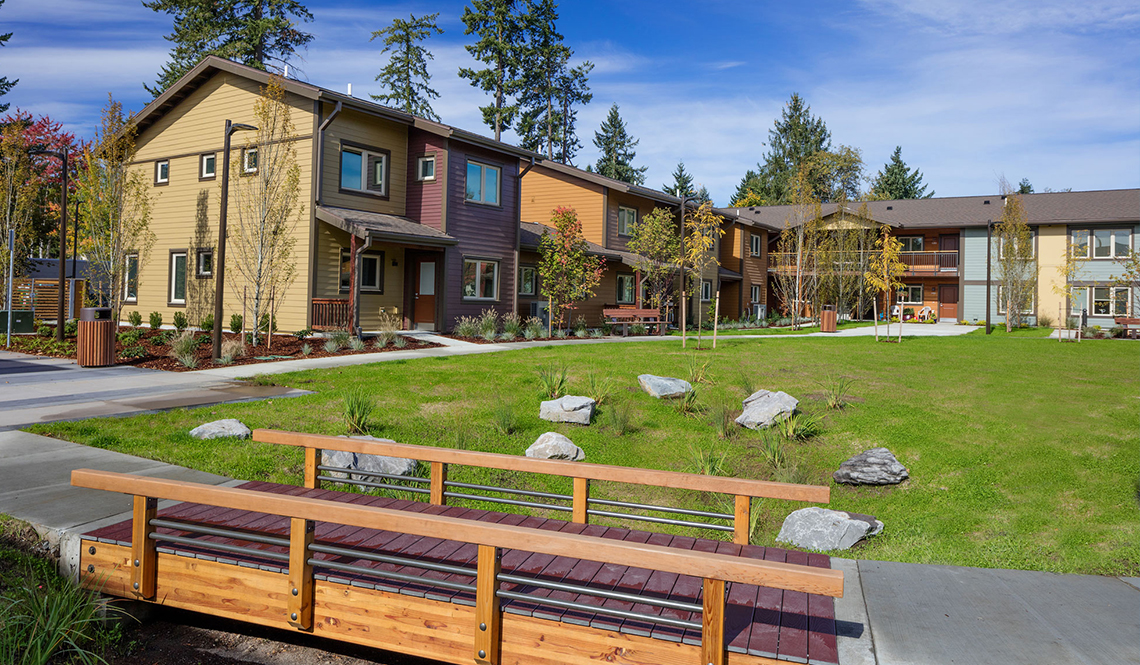
- Select a language for the TTS:
- UK English Female
- UK English Male
- US English Female
- US English Male
- Australian Female
- Australian Male
- Language selected: (auto detect) - EN
Play all audios:
Photo courtesy Bridge Meadows At a time when the definition of family is expanding, "intentional communities" (such as Bridge Meadows in Beaverton, Oregon) build supportive, caring
relationships. ------------------------- More than a third of people age 50 and over are single. Many are childless and live alone. Parents, especially single parents of young and teenage
children, are often overwhelmed and need help. Kids coming out of the foster care system need support and stability. The "intentional communities" housing model, developed on the
basis of residents’ shared interests or values, is an attempt to turn problems like those into solutions. Photo courtesy Bridge Meadows Older residents at Bridge Meadows (including Susan,
with her neighbor Reba) contribute at least 400 volunteer hours a year to the community by helping with childcare, tutoring, meal prep and more. BRIDGE MEADOWS, for instance, is a nonprofit
that creates “intentional intergenerational-living communities that bring youth who have experienced foster care, their forever families, and elders together.” Its goal is to “build place
permanence and purpose” for all involved. The organization’s first location, in Portland, Oregon’s Portsmouth neighborhood, has been in operation since 2011. The second development, in
Beaverton, Oregon, opened in 2017 with nine family town houses and 41 apartments for people age 55 or over. Those apartments are divided between two buildings on either side of the town
houses to encourage older residents to interact with other age groups. Every home looks out onto a central courtyard. There are ample indoor gathering spaces, and residents get together for
a weekly group meal dubbed the “Happiness Hour.” Bridge Meadows also has a full-time, on-site social worker. Beaverton Mayor Denny Doyle is a champion of Bridge Meadows. “Bringing more
affordable housing, particularly for seniors, is a top priority for the city,” he says. “This model of serving families in the process of adopting foster children in an inter- generational
complex is all the better.” At a stage of life when loneliness and social isolation are pervasive, the development’s older residents find both a ready-made community and affordable housing.
Beaverton resident Therese Madden Rose, who is in her 60s, was immediately sold. She moved from Virginia to Oregon to live at Bridge Meadows the day it opened. -------------------------
OTHER INTENTIONAL INTERGENERATIONAL COMMUNITIES INCLUDE: Photo courtesy Bastion ”Bastion has been a huge blessing for me and my family,” says retired Navy Master-at-Arms Malik Scott (with
his children and puppy) about the 38-household intergenerational intentional community. “It gave us hope at the time when hope was in question.” HOPE MEADOWS — RANTOUL, ILLINOIS The
inspiration for Bridge Meadows, HOPE MEADOWS is a small, five-block neighborhood in a small town. It was established in the mid-1990s for, the develop- ment explains, “three groups often at
risk of being marginalized in American society — kids caught in the child welfare system, families that adopt children with special behavioral and emotional needs, and retirees who are
seeking continued purpose in their daily lives.” BASTION — NEW ORLEANS, LOUISIANA A 5.5-acre intentional community for veterans who served in Iraq and Afghanistan, BASTION describes itself
as a "community of resilience" where “returning warriors and families” can develop “meaningful relationships that endure for a lifetime” and “sustain a thriving recovery from the
wounds and casualties of war.” LAS ABUELITAS — TUCSON, ARIZONA Championed and designed by grandparents, LAS ABUELITAS FAMILY HOUSING is a small, affordable “kinship care” community that
addresses the multigenerational needs of its residents. (Read "HOUSING FOR GRANDPARENTING" to learn more.) ------------------------- _This article is adapted from the "Build
Housing for All Ages" chapter of the AARP publication WHERE WE LIVE: COMMUNITIES FOR ALL AGES — 100+ INSPIRING EXAMPLES FROM AMERICA’S COMMUNITY LEADERS (2018 EDITION). Download or
order your free copy._ Article by Sally Abrahms | Page published April 2019 A-Z ARCHIVES SEE ALL








